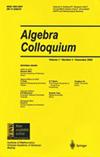李超代数的三个理想
IF 0.4
4区 数学
Q4 MATHEMATICS
引用次数: 0
摘要
定义了有限维李超代数的完美理想、近完美理想和上界理想,并通过它们的相关序列研究了这三种理想的性质。证明了李超代数是可解的,当且仅当其最大完美理想为零,或其最大完美理想的商超代数是可解的。我们还证明了李超代数是幂零的当且仅当它的极大接近完美理想为零。并且证明了一个幂零李超代数只有一个上界理想,这个上界理想就是幂零李超代数本身。本文章由计算机程序翻译,如有差异,请以英文原文为准。
Three Ideals of Lie Superalgebras
We define perfect ideals, near perfect ideals and upper bounded ideals of a finite-dimensional Lie superalgebra, and study the properties of these three kinds of ideals through their relevant sequences. We prove that a Lie superalgebra is solvable if and only if its maximal perfect ideal is zero, or its quotient superalgebra by the maximal perfect ideal is solvable. We also show that a Lie superalgebra is nilpotent if and only if its maximal near perfect ideal is zero. Moreover, we prove that a nilpotent Lie superalgebra has only one upper bounded ideal, which is the nilpotent Lie superalgebra itself.
求助全文
通过发布文献求助,成功后即可免费获取论文全文。
去求助
来源期刊

Algebra Colloquium
数学-数学
CiteScore
0.60
自引率
0.00%
发文量
625
审稿时长
15.6 months
期刊介绍:
Algebra Colloquium is an international mathematical journal founded at the beginning of 1994. It is edited by the Academy of Mathematics & Systems Science, Chinese Academy of Sciences, jointly with Suzhou University, and published quarterly in English in every March, June, September and December. Algebra Colloquium carries original research articles of high level in the field of pure and applied algebra. Papers from related areas which have applications to algebra are also considered for publication. This journal aims to reflect the latest developments in algebra and promote international academic exchanges.
 求助内容:
求助内容: 应助结果提醒方式:
应助结果提醒方式:


